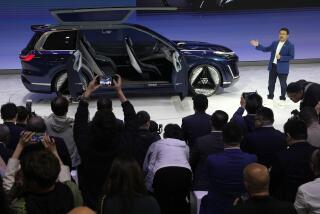Japanese Car Firms Found ‘Dumping’ : Autos: The government agrees with domestic makers that their rivals are selling minivans at unfair prices in the U.S.
DETROIT — In a victory for the Big Three auto makers--which could lead to higher sticker prices for some Japanese vehicles--the Commerce Department ruled Tuesday that Japanese companies are “dumping” minivans in the United States at unfairly low prices.
The decision came one day after top U.S. and Japanese auto executives agreed to work toward better relations and could lead to heightened trade tensions between Japanese auto makers and General Motors Corp., Ford Motor Co. and Chrysler Corp.
If the government finds that the dumping has injured the Big Three, who hold more than 90% of the lucrative minivan market, some Japanese auto makers could face stiff fines. A final ruling by the International Trade Commission is expected in June.
Coming on the heels of a Japanese government report--which showed substantial growth in Japan’s auto shipments to the United States last month--the Commerce Department ruling reflects the war raging on several fronts between the two auto industries, despite the carefully diplomatic tone struck by their leaders Monday.
The Commerce Department estimated that Mazda Motor Corp. charges 12.7% less for a minivan in the United States than it does in Japan. Toyota Motor Corp. charges 6.8% less, and other Japanese manufacturers, which hold a negligible portion of the market, charge 9.9% less, according to the ruling.
Those numbers--known as dumping margins--are higher than figures released in December after a preliminary investigation. But they are far below the dumping margins that the Big Three accused the Japanese of last June. U.S. auto makers said Toyota priced its Previa as much as 30% below “fair value,” and Mazda priced its MPV as much as 27% below.
In compliance with the ruling, Japanese firms must post a cash bond equal to the price difference. The department did not have a dollar figure on the price differences. The value of minivans imported from Japan was estimated at $1.2 billion in 1990, it said.
Jim Olson, a spokesman for Toyota’s U.S. sales arm, said the ruling “may be politically correct, but it’s factual fantasy.”
GM, Ford and Chrysler welcomed the news. In a departure from the peace-and-harmony rhetoric that dominated Monday’s meeting between the auto executives, Chrysler said: “Our government has finally said enough ! . . . The reason the Japanese manufacturers can afford to dump is because 97% of their market is protected for the home team.”
But the Big Three, whose representatives will have a chance to testify Thursday before an ITC hearing on the dumping case, may be hard-pressed to prove that they were injured by the Japanese firms’ unfair pricing.
GM, Ford and Chrysler’s collective share of the minivan market jumped from 88.5% in April, 1991, to 93.2% last month. Toyota held 3.9% of the market, down from 6.3% a year earlier. Mazda’s April share fell from 4.4% to 2.8%.
Many economists note that consumers stand to lose from anti-dumping petitions, which tend to push prices up throughout the market.
Whether in response to the political pressure of the dumping suit or economic need, Toyota raised the base price on its Previa 10.4% in September and 6% in March. Its price range now--$17,518 to $25,518--makes it one of the most expensive minivans in the United States. Mazda’s MPV, which has jumped nearly $900 since December, sells for between $17,710 and $21,360.
Both auto industries’ trade associations insisted Monday that a “business-to-business” meeting such as this week’s was the best way to achieve progress toward reducing the $30-billion U.S. auto trade deficit with Japan. Still, it appears that the Big Three will take whatever help they can get from the government in battling their Japanese rivals.
If the minivan suit is settled in the U.S. makers’ favor, many analysts expect them to press similar charges against Japanese luxury cars, which are fast nibbling away at another high-profit market formerly monopolized by Big Three and European auto makers.
And Ford and Chrysler executives have made no secret of their support for legislation pending in the House to limit U.S. production of Japanese name-brand vehicles.
While the Big Three maintain that such tactics are necessary to protect U.S. jobs and strengthen the economy, they may cast a shadow on the fragile agreement to work toward cooperation and future dialogue that emerged from Monday’s meeting.






